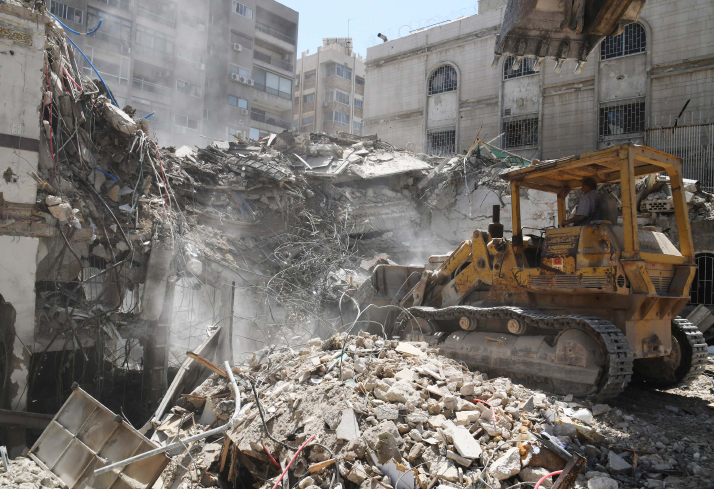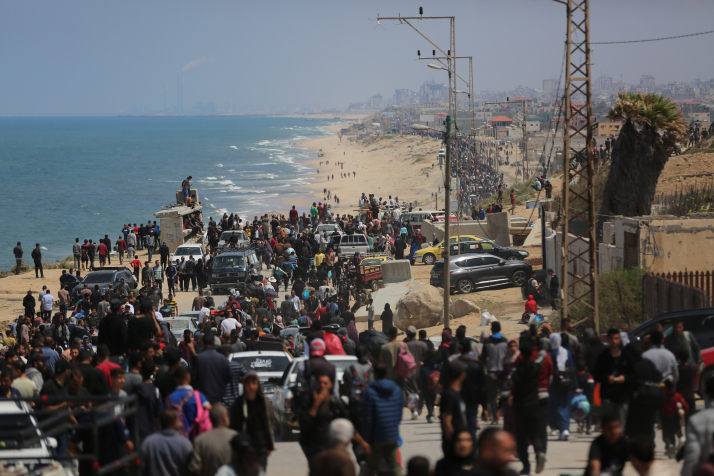| World |
| Falling into the abyss? | |
|
|
 A rescuer works at the site of an Israeli missile attack targeting the consular building of the Iranian Embassy in Damascus, Syria, on April 2 (XINHUA)
If it's not one thing, it's another. In the midst of the ongoing conflict between Israel and the Palestinian Islamic Resistance Movement (Hamas) in the Gaza Strip, a new round of conflict has erupted between Iran and Israel. On April 14, tensions intensified after Iran launched retaliatory strikes on Israel in response to Israel's bombing of an Iranian diplomatic building in Syria's capital Damascus on April 1, which killed at least one senior figure in Iran's Islamic Revolutionary Guard Corps and six other officers as well as six Syrians. According to the Associated Press, Israel has vowed to retaliate against Iran, risking further expansion of the shadow war into a direct conflict. Concerns are growing globally as the Middle East seems to be descending into more profound chaos. Eye of the storm "We're living in a period where the threat of global war has never been higher in many different areas of the world, from many different flash points," Danny Haiphong, a U.S.-based independent journalist, political analyst for The Left Lens YouTube channel and coeditor of the Friends of Socialist China website, told Beijing Review. Tension between Iran and Israel is the latest spillover of the Gaza conflict, Dai Bing, the charge d'affaires of China's Permanent Mission to the United Nations, said at an emergency Security Council meeting, adding that it serves as another reminder that the Palestinian question remains central to the Middle East issue and has a bearing on the peace, stability and long-term security in the region. Since its outbreak in October last year, the current round of the Palestinian-Israeli conflict has continued to affect the regional situation and has become the "eye of the storm," Wang Jin, a researcher with the Institute of Middle Eastern Studies at Northwest University, told Beijing Review. Liu Zhongmin, a professor of Middle East studies at Shanghai International Studies University, said the spillover effects are being felt in various directions, including in the Red Sea, Lebanon, Syria, Iraq and the Persian Gulf region. Israel's continuous cross-border attacks on Shiite militias in Syria, Hezbollah in Lebanon and other armed groups have led to continued tension in the Israel-Lebanon-Syria border area, Wang explained, adding that on the other side, Yemen's armed Houthi forces have attacked Israeli and U.S. ships sailing in the Red Sea in support of resistance forces in Gaza, while the U.S. has deployed fleets in the Red Sea to provide military escort and conducted multiple airstrikes on Houthi military sites. Any further escalation of tension between Iran and Israel will undoubtedly affect stability in the Gulf, Liu told China Daily. "The Middle East is on the brink. The people of the region are confronting a real danger of a devastating full-scale conflict. Now is the time to defuse and deescalate," UN Secretary General António Guterres said during a meeting of the UN Security Council, held after Iran launched its military strike on Israeli territory. Guterres warned members not to further escalate tensions with reprisals against Iran.  Displaced Palestinians head north on the central section of Rashid Road in the Gaza Strip on April 14. The Israeli army allowed some Palestinians to return to the northern part of the Gaza Strip on the same day (XINHUA)
Cooling down vs. adding fuel China has stepped up diplomatic efforts to rein in the conflict. Chinese Foreign Minister Wang Yi held phone conversations with his counterparts in Iran and Saudi Arabia on April 15, pledging that China will work to prevent the regional security environment from deteriorating. He emphasized, during the phone talks, that the top priorities include immediately realizing an unconditional and lasting ceasefire, effectively protecting civilians and ensuring the uninterrupted flow of humanitarian assistance. On the same day, Special Envoy of the Chinese Government on the Middle East Issue Zhai Jun met with Israeli Ambassador to China Irit Ben-Abba Vitale. Zhai elaborated on China's principled position on the conflict in Gaza and said China is deeply concerned about the current escalation of regional tensions, and conflicts and bloodshed serve the interests of no one. "All parties concerned should exercise maximum calm and restraint," Zhai added. China seeks to maintain communication and coordination with related parties that can play their roles in the region and around the globe to jointly cool down the current tensions in the Middle East, Liu said. However, U.S. Treasury Secretary Janet Yellen said on April 16 that the U.S. intends to hit Iran with new sanctions in the coming days. EU foreign policy chief Josep Borrell also stated on the same day that the EU has started work on expanding Iran sanctions. Due to opposition from the U.S., Britain and France, the UN Security Council failed to condemn Israel's attack on Iranian diplomatic institutions on April 1. In contrast, the U.S. called on the UN Security Council to condemn Iran soon after Iran's military strike on Israeli territory, warning that Iran "will be held responsible" if it attempted further military action against Israel. Iran has been living under U.S. sanctions for decades. So far, the U.S. has pushed for four UN Security Council resolutions imposing sanctions on the country. Haiphong said Iran has "no voice and ability to have the international community come to its aid when the UN Security Council was hamstrung by a number of countries—the United States and other Western countries—that tend to dominate the institution and use it for political purposes." In this sense, Iran was just trying to meet "military aggression with a military response," he added. "The U.S. bears a large part of the responsibility for what is happening because it did not put deterrents on Israel," Samir Ragheb, head of the Arab Foundation for Development and Strategic Studies in Egypt, told Xinhua News Agency. According to the Ministry of Health in Gaza, the Israeli attack in Gaza has so far left more than 33,000 dead and about 76,000 wounded. Despite its constant claim to defend human rights, the U.S. "did not move a finger when about 34,000 civilians, most of whom were women and children, were killed in Gaza," Ragheb said. "Everyone recognizes that those people were killed with U.S. weapons, deadly ammunition, and U.S. protection," he added. Echoing Ragheb's opinion, Iraqi political analyst Mustafa Khalil said the root cause of these latest Middle East tensions is Washington's longstanding hegemonic policy and bias on the Palestine-Israel issue, which is pushing the entire Middle East region to the brink of war. He urged the U.S. to change its hegemonic approach in the region and promote peace talks and a ceasefire. Copyedited by G.P. Wilson Comments to mamm@cicgamericas.com |
|
||||||||||||||||||||||||||||
|